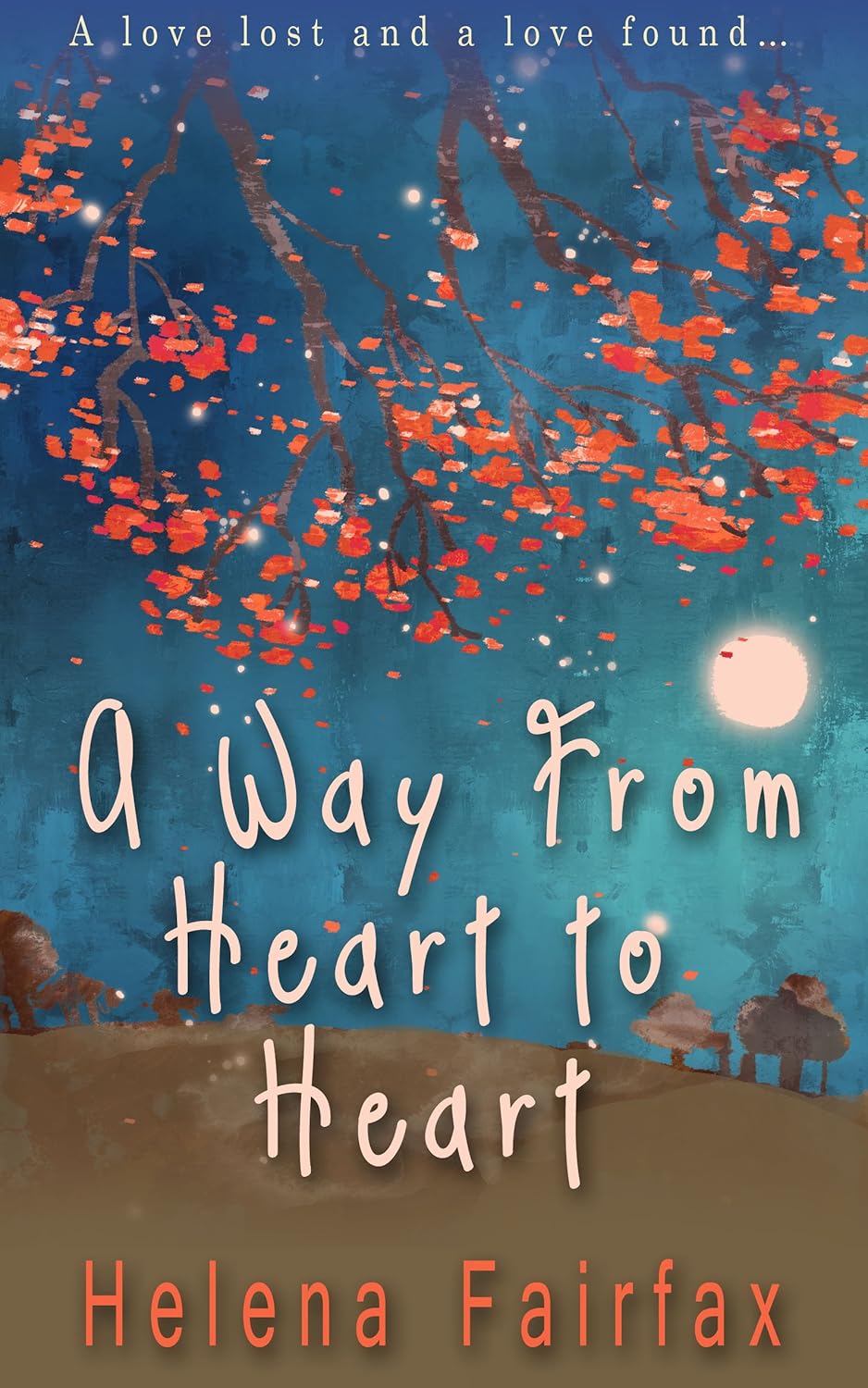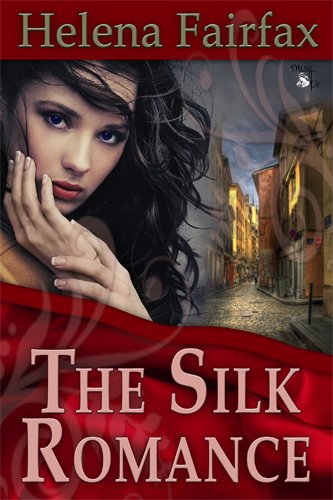I am pleased to feature another author with a fascinating multicultural background. Helena Fairfax is a British author who was born in Uganda and came to England as a child. She's grown used to the cold now, and these days she lives in an old Victorian mill town in the north of England, right next door to the windswept Yorkshire moors. She walks this romantic landscape every day with her rescue dog, finding it the perfect place to dream up her heroes and her happy endings.
Helena writes engaging contemporary romances with sympathetic heroines and heroes she's secretly in love with. She likes nothing better than the warm glow of a happy ending, and when the final scene of one of her novels won a competition for "The Most Romantic Love Scene Ever" it made her day. Her first novel, The Silk Romance, was a contender for the UK's Romantic Novelists' Association New Writers' Scheme Award.
MJN: I am absolutely fascinated by your background. Irish
mother, British father, born in Uganda of all places. You've lived in
eleven different cities and now you reside in a historical mill town. Given
your international background, do you find it easy to shift through time
and space?
HF: I’d absolutely love to
be able to shift through time! I’ve been fascinated by the idea ever since I
read A Traveller in Time by Alison
Uttley as a child. Her book features a heroine who travels back to the time of
the Tudors, and I was gripped by it.
There are very many
parts of the UK where history has been preserved, from Stonehenge to medieval
castles, to the Victorian terraced houses (like mine) in which thousands of
people live today. It’s not hard to feel yourself surrounded by the past…but it
would be something else to be actually transported there for real.
The novel I’m working on
next will be a YA time slip novel set near Hadrian’s Wall, involving Druids and
Roman soldiers.
Your
question has made me think hard about how my background travelling has affected
my writing. I think one way is that it’s made me able to empathise with
outsiders, and with the culture shock of arriving in a place that’s totally
foreign. Hopefully that will come in good stead with this novel, both for
writing my teenage heroine (teenagers often feel like outsiders) and for
describing the disorientation of time travel.
MJN: Given that you live in the same place where Emily Bronte's novel "Wuthering Heights" is set, are you haunted by the ghosts of Heathcliff and Catherine? Your work has been described as charming and delightful. You are not a brooder, I take it?
MJN: Given that you live in the same place where Emily Bronte's novel "Wuthering Heights" is set, are you haunted by the ghosts of Heathcliff and Catherine? Your work has been described as charming and delightful. You are not a brooder, I take it?
HF: I don’t often think of
Heathcliffe and Catherine, but I do think of the Brontë sisters, and what life
must have been like for them. Like I said above, we’re surrounded by history
here; I’ve been to the Parsonage where the Brontës lived, and walked their
streets and the moors above their house. They would have been very isolated in
those days, and life must have been hard.
I
can understand why my novels have been described as “charming” and
“delightful.” They have a happy ending, as all romances do. They do have darker
themes in them, though, especially my latest release, A Way from Heart to Heart, which deals with grief, teenage
homelessness and broken families. (It sounds quite brooding when I describe it
like that, but it’s a heartwarming novel with a happy end!)
MJN: Your debut novel The Silk Romance was nominated for the Romantic Novelists’ Association Award for New Writers, as well as a runner-up in the Global E-Book Awards. How did you go about submitting your work for those awards? It seems that there are so many contests, and so many new authors. How do you circumvent the volume and get noticed?
MJN: Your debut novel The Silk Romance was nominated for the Romantic Novelists’ Association Award for New Writers, as well as a runner-up in the Global E-Book Awards. How did you go about submitting your work for those awards? It seems that there are so many contests, and so many new authors. How do you circumvent the volume and get noticed?
HF: I wrote The Silk Romance through an excellent
scheme for new writers run by the RNA. (You can find out about the scheme here:
http://www.romanticnovelistsassociation.org/join/new_writers_scheme)
Anyone who enters the scheme and subsequently has their novel published is put
forward for the New Writers’ Award.
I
submitted The Silk Romance for the
Global E-Book Awards on the recommendation of an author friend.
I
wish I knew the answer to the question of how to circumvent the volume and get
noticed. I think it’s a good thing, though, for writers to enter competitions,
and I’ve also submitted short stories in the past. If you win, there is the
chance that you will get noticed by an agent, and the fact that you’ve won can
only look good on your writing CV. If you don’t win, at least you will have
another short story to add to your portfolio, and it may find a home elsewhere.
I
recently entered the Exeter Novel Prize (details here: http://www.creativewritingmatters.co.uk/the-2014-exeter-novel-prize-competition-rules.html
) with the Roman time slip novel I mentioned above. I entered it specifically
because it was being judged by Broo Doherty, an agent I really admire. My entry
has made the shortlist of six. (The winner will be announced on 28th
March.) This is great news, as it means I now have the attention of a really
good agent. Even if I don’t win, it’s still been well worth entering the
competition.
MJN: As an author (and person) I have been noted for my pessimistic, grim view of humanity and life in general. I don't have a single happy ending. You clearly did not grow up in a bubble, and you've seen mankind at its best and its worst, and yet your writing is sunny and sweet. Do you think that our optimistic or pessimistic disposition is something we are born with, or something that we can cultivate?
HF: write stories that end
happily, and, even though some of the themes are quite dark, I prefer to write
(and read) joyful endings. I don’t think this is due to my disposition. I
suffer quite badly from depression. I do think, though, that even though we’re
surrounded by images of war and greed on a grand scale, and on a minor scale we
have to sit next to that bitchy person at work, and someone pushes in whilst we’re
queuing for the bus, and all the other negatives that can happen to us in a
day, I believe that overall we have a great capacity for love. I’m not sure why
that’s a view I’ve developed rather than a pessimistic view. (Maybe I’d need
some in depth counselling to get to the bottom of it!)
MJN: You published two of your novels on your own, and one with a small press. Which experience did you find more rewarding and conducive to moving copies? Have you found the balance between creative freedom and third party marketing and editorial support?
HF: Actually all three of
my novels were published with small presses: the first two with MuseItUp in
Canada, the third with Accent in the UK. I received the print rights to the
first two, and self-published them (in print only) last year. Both experiences
have positives and negatives. Through my publishers I’ve met some wonderful
fellow authors and made friends all round the world. I’ve had various editors –
some good, some bad – and the advice from the good editors has transformed my
writing. I think with small presses you still have to do the majority of the
work regarding marketing and selling, but the fact that you’re published under
their name adds credibility. It also is a massive help that they take care of
distribution and deal with sales outlets. There’s a limit to how much an author
can do in the day! For my next novel I’ll still be seeking a traditional
publisher, but I may look into self-publishing in the future.
My
latest release, A Way from Heart to Heart,
is published by Accent Press, and is set in London and on the Yorkshire moors
near where I live.
Here
is the blurb:
After the death of her husband in Afghanistan, Kate Hemingway’s
world collapses around her. Her free time is spent with a charity for teenage girls,
helping them mend their broken lives - which is ironic, since her own life is
fractured beyond repair.
Reserved, public school journalist Paul Farrell is
everything Kate and her teenage charges aren’t.
But when Paul agrees to help Kate with her charity, he makes a stunning
revelation that changes everything, and leaves Kate torn. Can she risk her
son’s happiness as well as her own?
Available
in print and e-format
Amazon: http://authl.it/B00PQRJ0WQ
You
can find out more about my books on my website www.helenafairfax.com, on
Facebook https://www.facebook.com/HelenaFairfax
and on Twitter
Thanks for having me today, Marina, and for your
thought-provoking questions!




No comments:
Post a Comment